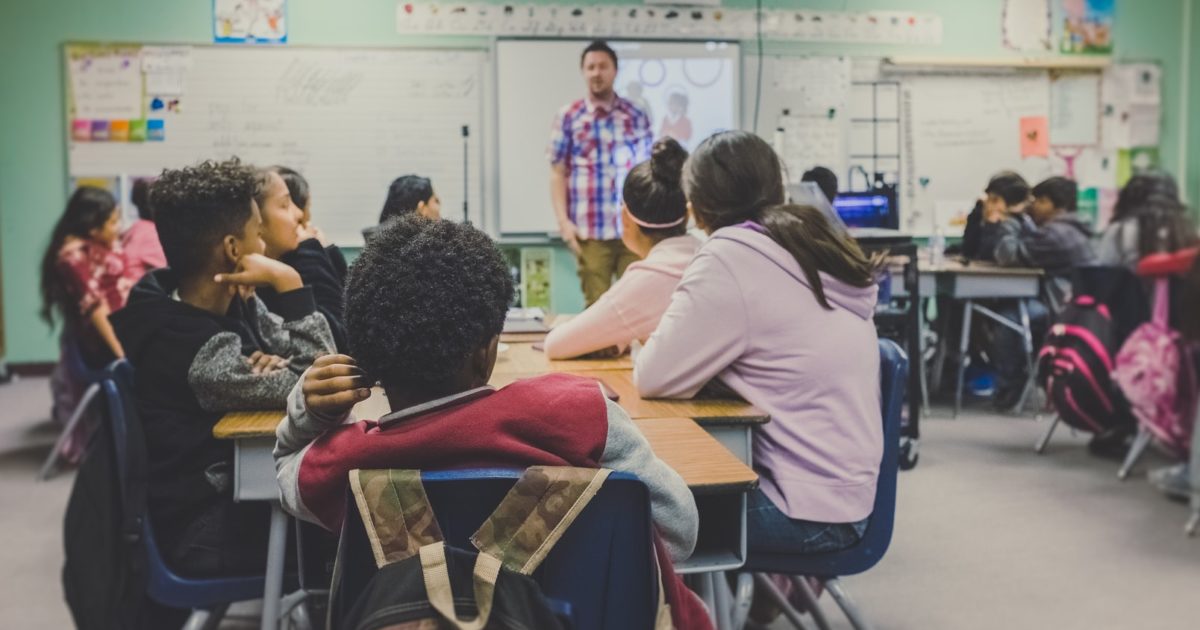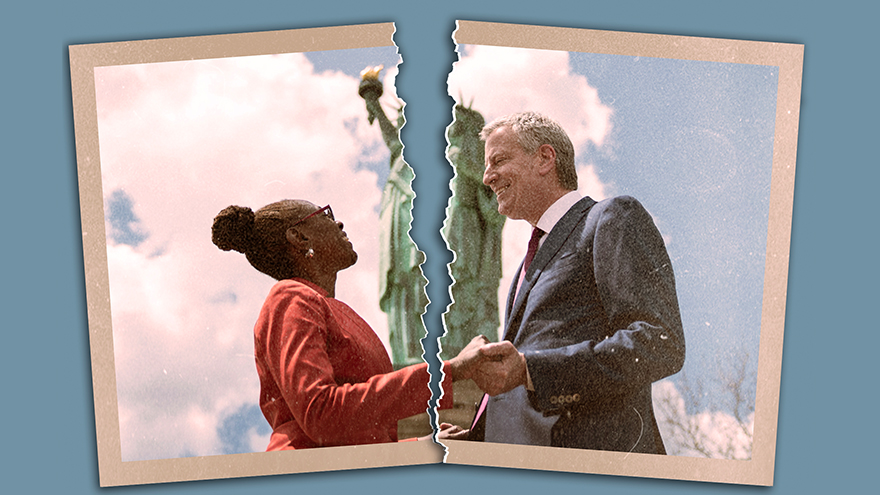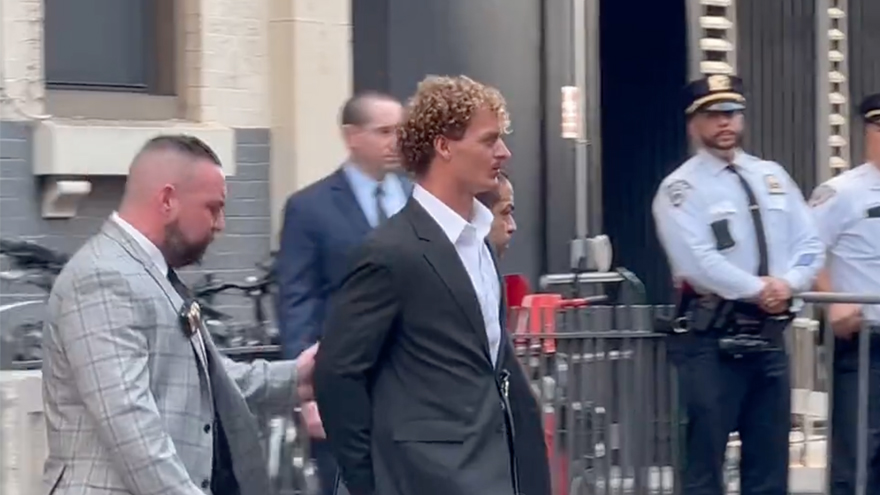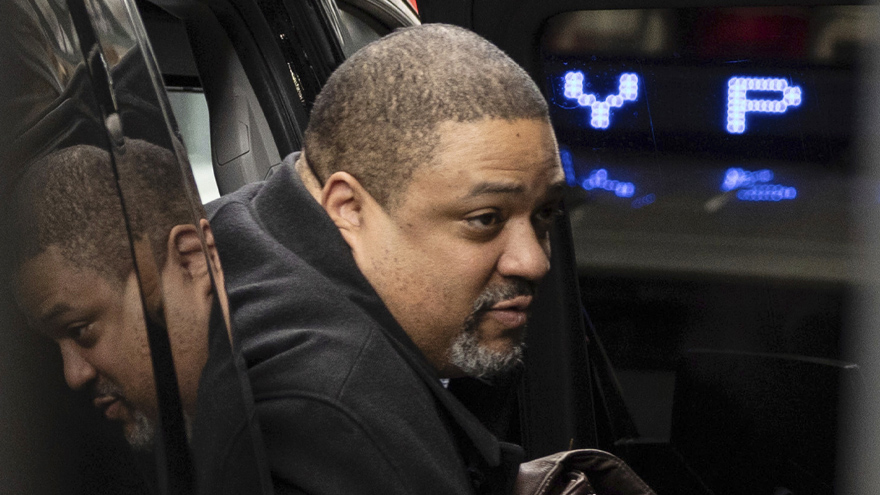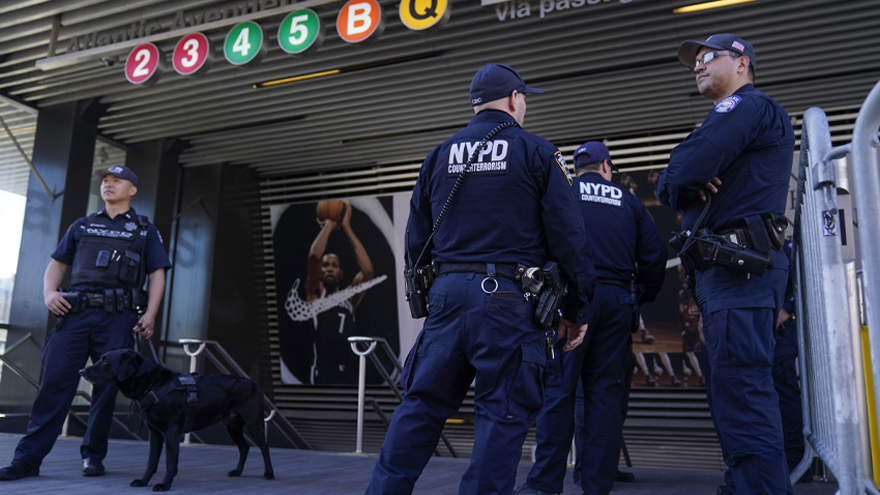New documents from the New York City Public School District shows administrators and teachers discussing ways to discuss “systemic racism” in America after the guilty verdict of Derek Chauvin.
“We must provide a safe and structured environment in which to provide our students with the tools to understand this case, as well as to think critically about the existence of systemic racism in the United States,” states the document.
“Do not make statements that things will be OK, as we can not ensure this for all students,” adds the material. “How can we support students, colleagues, families, and ourselves through this trauma?
Read the full release below:
Part 1: Resources to Support Instruction and Discussion
It is incumbent upon educators to support students in processing current events, as is the case with the jury’s decision in Derek Chauvin’s trial for the killing of George Floyd. We must provide a safe and structured environment in which to provide our students with the tools to understand this case, as well as to think critically about the existence of systemic racism in the United States. To support these efforts, the Social Studies and Civics Department has compiled a resource list to support teachers in holding conversations with their students following the decision in the trial. Our students are participants in our democracy, and it is important that they have an opportunity to reflect on how this decision and the existence of systemic racism and inequality affects them.
This guide is being compiled as events unfold and will be updated to include additional resources. Included are teacher facing resources, student facing resources with focus questions and questions for discussion, and links to relevant lessons from the NYCDOE Passport to Social Studies and Civics for All curricula. Social Studies teachers are also encouraged to use primary source analysis strategies with images and text, alongside appropriate support and context, to encourage students to begin and lead classroom conversations. Discussion of the trial and verdict, and its proximity to the recent murders of Daunte Wright and Adam Toledo, may generate feelings of fear or anger in students. It is important to create a space, whether in the physical classroom or using your remote learning platform, for students to express discomfort and feelings of anger or distress that may emerge from discussing this event. Facing History and Ourselves has resources on maintaining a student centered approach through the virtual classroom, they can be accessed here and here.
NOTE TO TEACHERS: A recommendation for instruction in response to the decision and sentencing in the trial of Derek Chauvin. DO NOT watch live news coverage during a class with students in either a remote or in-person setting:
● Watching news live makes it difficult for adults to control their emotions and reactions
● Students are looking to school staff to maintain a calm and safe environment
● Live coverage may be extremely stressful, traumatizing, or retraumatizing to students
● Do not make statements that things will be OK, as we can not ensure this for all students[1]
Teacher Facing Resources
| Resource | Summary |
| New York City Department of Education, Civics for All | Relevant civics lesson plans for grades 6-12 : Grades 6-8, Part 2, p. 45, Types of ResistanceGrades 6-8, Part 2, p. 68, Student AgencyGrades 6-8, Part 2, p. 111, ActivistsGrades 6-8, Part 2, p. 136, Political MuralsGrades 6-8, Part 2, p. 149, A Just SocietyGrades 6-8, Part 2, p. 290, Civic Participation StrategiesGrades 6-8, Part 2, p. 317, Organizing Direct ActionGrades 9-12, Part 1, p. 119, How Do Cases Move Through the Judicial System?Grades 9-12, Part 1, p. 135, Friends of the CourtGrades 9-12, Part 1, p. 176, Citizen AgencyGrades 9-12, Part 2, p. 18, Understanding Systemic Injustice and OppressionGrades 9-12, Part 2, p. 146, Hashtag ActivismGrades 9-12, Part 2, p. 200, Evaluating Efficacy of Civic Action |
| NYCDOE, 1619 Project: Connections to the Passport to Social Studies and Civics for All Curricula | The 1619 Project, a New York Times initiative, marks the significance of the 400th anniversary of the arrival of more than 20 Africans at Point Comfort in the Virginia Colony. In August 1619, the British Colonies of North America entered into the horrific Trans-Atlantic Slave Trade and the practice of race-based slavery. In addition to marking the anniversary, the publication’s essays, articles, and poems seek to center the role and agency of African Americans in the larger narrative of United States History. According to its editors, The 1619 Project “aims to reframe the country’s history, understanding 1619 as our true founding, and placing the consequences of slavery and the contributions of Black Americans at the very center of the story we tell ourselves about who we are.” This resource identifies NYCDOE Passport to Social Studies, Civics for All curriculum lessons, and Hidden Voices profiles that can be connected to and enriched by corresponding essays or poems from the Project. These lessons can be utilized to support, amplify and help students create context for the thought-provoking ideas presented in The 1619 Project. The topics in the table are arranged in approximate chronological order by theme. |
| NYCDOE, Resources to Support Discussions On Racism and Systemic Inequality | This document is a compilation of resources to support classroom discussions on racism and systemic inequality. Resources linked from this document can be used to extend the conversation and further contextualize the events that occurred. |
| Dr. Nicole A. Cooke, The University of South Carolina, Anti-Racism Resources for All Ages | A curated collection of annotated resources that emerged out of the pain and frustration associated with the back-to-back deaths of GeorgeFloyd, Breonna Taylor, and Ahmaud Arbery in 2020. |
| Education Week, Discussing the Derek Chauvin Trial in Class: How Teachers Are Doing It, and Why | An article that reviews some of the ways that educators are teaching about the events in and connected to the Derek Chauvin case. |
| Education Week, 16 Resources on Talking to Students About Police Killings and Racism | A collection of resources for educators looking for ways to talk with students about police killings and racism. Resources include: articles, student views, opinion essays, and other materials. |
| Facing History, Accountability, Justice, and Healing After Derek Chauvin’s Trial | A teaching idea from Facing History designed to help guide an initial class discussion on the verdict in Derek Chauvin’s trial. Activities prompt students to explore complicated concepts of justice, accountability, and healing, while supporting them to process their feelings before engaging in a deeper study of policing and the legacy of racial injustice. |
| Facing History, Bearing Witness: The Death of George Floyd | A blog posting by Roger Brooks, the President and CEO of Facing History and Ourselves, with personal reflection and pedagogical responses to the killing of George Floyd. |
| Facing History, Fostering Civil Discourse | A resource designed to help teachers prepare students to engage in civil discourse, whether in-person, remotely, or both. |
| Fresh Air, I Can’t Breathe, Racism and White Supremacy | Audio recordings of interviews with authors like James Baldwin, activists like Bobby Seale, and artists like Nina Simone as they discuss their struggle for humanity against American racism. Listen to firsthand accounts from a Black police officer and a Black lawyer as they reflect on the fight for justice. |
| Learning for Justice, Teaching in the Wake of Police Violence | An article that explores questions of how to teach about issues of systemic racism and its relationship with police violence towards Black Americans. A question that framed the creation of this document is: How will teachers talk with their students about injustice, police violence and the fact that Black lives matter? The resources suggest a few places for educators to begin the conversation. |
| Learning for Justice (Revised in Spring 2020 for NYCDOE), #USvsHate: Anti-Hate, Bias, and Inequality Resources | The #USvsHate project, created by Learning for Justice, is a nationwide anti-bias initiative to amplify student voice and push back against messages of bias, bigotry, and hate. Working with organizations including the American Federation of Teachers, Facing History and Ourselves, Teaching for Change, Rethinking Schools and others, #USvsHate offers an extensive curated collection of lessons, allowing students to strengthen their capacity to thrive in an increasingly diverse democracy. Educators will find resources for working with students to build an inclusive school community and to understand—and push back against—various forms of hate. Those looking specifically for lessons on topics like racism, antisemitism, homophobia, transphobia and more will find a wide variety of lessons for students at all grade levels. |
| Learning for Justice, When Bad Things Are Happening | An article for teachers on how to discuss crises with students as they unfold. |
| Mikva Challenge, Processing the Verdict in the Derek Chauvin Trial Lesson Plan | A lesson plan from Mikva Challenge in which students reflect on the fight for racial justice in America and what more every citizen can do to take action for a more just society. |
| National Council of Teachers of English, There is No Apolitical Classroom: Resources for Teaching in These Times | A position statement written by NCTE’s Standing Committee Against Racism and Bias in the Teaching of English. |
| National Geographic, Talking to Kids About Race | Guidance for supporting discussions with young children on racism in the United States. |
| New Yorker, Bryan Stevenson on the Frustration Behind the George Floyd Protests | An interview with Bryan Stevenson, a civil-rights lawyer, founder of the Equal Justice Initiative, and author of Just Mercy, on the effects of and response to systemic racism and police violence in the United States. |
| New York Times, Criminal Justice System Lesson Plan | This resource from the New York Times offers a lesson plan that supports students in debating which aspects of criminal justice reform are most pressing. |
| New York Times, Derek Chauvin Trial Lesson Plan | This resource from the New York Times offers a lesson plan during which students will learn how schools across the country are addressing the trial of the former police officer charged with the murder of George Floyd. |
| PBS NewsHour, Derek Chauvin Trial Lesson Plan | This resource from PBS NewsHour offers a high school lesson plan focused on answering the essential question of: What does the role of trauma play in people’s lives as it relates to police brutality and ensuing court trials? Students will watch a video and engage in discussion, with the option for a research extension activity. |
| PBS NewsHour, Trial of Derek Chauvin, charged with killing George Floyd – Closing arguments | Video from PBS NewsHour on the closing statements in the murder case against former Officer Derek Chauvin in the death of George Floyd from Monday, April 19, 2021. |
| St. Paul, Minnesota Public Schools, Breaking News | Guidance on teaching significant and current events in a responsive and proactive framework. Slides 13-17 provide information on the trial of Derek Chauvin. |
Student Facing Resources (with supporting focus and discussion questions)
PBS Kids, When Something Scary Happens
Description: Resources for use with young students in challenging times. This is a collection of various activities and videos for younger students to help them deal with emergencies and crisis situations. This resource will support lessons for students in grade K-4.
Focus Question for When Something Scary Happens: Who do we look to for help in a crisis?
Discussion Questions:
- Why is it important to tell people how you feel when you are worried or scared?
- Who would you look to for help in an emergency?
- What are some ways that you can help other people understand how you are feeling when you are scared?
- (For grades 3-4) Are there things that you have heard in the news that make you concerned or upset? Who can you talk to about this?
- (For grades 3-4) What are some things that we can do to respond to those things that you have heard about in the news?
NPR, Derek Chauvin Found Guilty Of George Floyd’s Murder
Description: An informational article about the decision, case, and facts presented in the trial of Derek Chauvin. This resource will support lessons for students in grades 5-8.
Focus Questions for Derek Chauvin Found Guilty Of George Floyd’s Murder: Why was Derek Chauvin on trial? What was the decision in the case?
Discussion Questions:
- What were the charges against Derek Chauvin? What was the jury’s decision in the case?
- What was George Floyd’s brother’s response to the decision in the trial of Derek Chauvin?
- Why does the article say that testimony in this case was remarkable?
- How does the journalist Laurel Wamsley characterize the arguments of the two sides in this case?
- How is this case related to events outside the courtroom?
Washington Post, Derek Chauvin’s Trial is not Justice for Black Americans
Description: In an op-ed written the day before the decision in the trial of Derek Chauvin, Peniel Joseph, the Barbara Jordan chair in ethics and political values at the LBJ School of Public Affairs at the University of Texas at Austin, argues that a guilty verdict will not provide a sense of justice alone. He makes the case that further work and activism is necessary to dismantle systemic racism. This resource can support lessons in 9-12 classrooms.
Focus Question for Derek Chauvin’s Trial is not Justice for Black Americans: Why does Peniel Joseph argue that a guilty verdict alone will not “feel like justice”?
Discussion Questions:
- Dr. Joseph states that, “Advances in Black citizenship and dignity often arise, when they come at all, from demands made outside formal legal and political settings.” What examples in history support this statement?
- What has the role of social and political protest been in advancing the rights of Black Americans?
- What does Dr. Joseph mean by the statement, “Progress flows more readily from outside the system in other aspects of democracy as well”? Do you agree or disagree? Why?
- What needs to happen in the United States to reach “full Black citizenship and dignity, the twin goals of the civil rights movement”?
New York Times, John Lewis’ Together, You Can Redeem the Soul of Our Nation
Description: Representative John Lewis, friend and mentee of Martin Luther King Jr., was a civil rights leader and congressman who died on July 17, 2020. He wrote this essay shortly before his death. There is also a recording of Morgan Freeman reading Representative Lewis’ last words. This essay can be used to help frame discussions for how we can collectively move forward and work together to dismantle structural inequalities.
Focus Question for Together, You Can Redeem the Soul of Our Nation: How did John Lewis suggest we connect the activism of the past to our collective activism in the present as a way to dismantle racism?
DIscussion Questions:
- What did Rep. John Lewis mean when he wrote, “Emmett Till was my George Floyd. He was my Rayshard Brooks, Sandra Bland and Breonna Taylor”?
- What does Rep. Lewis mean by getting in “good trouble, necessary trouble”?
- How can you get in “good trouble”? What makes it necessary?
- What needs to be done for historians to “say that it was your generation who laid down the heavy burdens of hate at last and that peace finally triumphed over violence, aggression and war”? To what extent is it possible? What can make it possible?
- How can we carry on the legacy of Rep. John Lewis?
News Literacy Project, Practice Good Information Hygiene: Sanitize Before You Share
Description: This resource was created to help students respond to the misinformation swirling around the COVID-19 outbreak. However, the four-step process provides guidance for students on the importance of consuming and sharing online content with care, including information about the verdict in the trial of Derek Chauvin.
Focus Question for Practice Good Information Hygiene: Sanitize Before You Share: How can we practice good critical reading and understanding of online content to ensure that the information we share is accurate?
Discussion Questions:
- What does accurate mean to you? What does credible mean to you?
- What are the four steps to sharing credible and accurate information?
- Why is it important that we share credible and accurate information?
- What questions do you have about what happened? Where can we look for answers to those questions?
- How did misinformation lead to these events?
- Why is it important that we make sure the information we share about the verdict in the trial of Derek Chauvin is credible and accurate?
Part 2: Resources to Support Mental Health & Wellness
Regardless of age, many students have an awareness of the significance of the Derek Chauvin trial in the search for justice following the death of George Floyd. These events have gripped our nation and reflect the hurt, anger, and pain of generations of racial trauma. Emotional responses may manifest in different ways, including anger, irritability, anxiety, grief, and hopelessness. As caring adults, you are an important resource to help them process the outcome of the trial. Now more than ever, we need to be well versed in understanding the signs of trauma or distress not only for our youth, but also for ourselves and our colleagues. We should also be aware of effective strategies that school communities can implement to support children and families who are struggling. To tackle these challenges, the Supportive Environment Framework identifies research-based practices that ensure physical and emotional safety, foster collaborative and trusting relationships, prioritize student health and wellness and advance equity.
Essential Questions:
- How can we support students, colleagues, families, and ourselves through this trauma?
- How can we leverage restorative practices to promote healing, community, and student voice?
- How can we attend to the mental, emotional, and physical wellness of our students, colleagues, families, and communities?
| Resource | Summary |
| DOE Mental Health webpage | DOE landing page with contact information for local mental health resources, including telehealth services for students and adults. |
| Mental Health: Parent & Educator resources | Mental health includes our emotional, psychological, and social well-being. It affects how we think, feel, and act. It also helps determine how we handle stress, relate to others, and make choices. Mental health is important at every stage of life, from childhood and adolescence through adulthood. |
| Restorative Circles | For support in using a virtual classroom community building circle. See also Morningside’s Listening Circle on George Floyd. |
| Addressing Race and Trauma in the Classroom: a Resource for Educators | This resource from the National Child Traumatic Stress Network (NCTSN) is designed to help educators understand the interplay of race and trauma in the classroom. The guide reviews historical trauma and racial trauma, explains the impact of trauma on different age groups, and offers supplemental resources. |
| Child Mind Institute Talking to Kids About Racism and Violence | Parent resource to help support children in navigating their emotions when talking about racism and violence. Presented are a few guidelines to assist parents in leading and learning from these conversations. |
| Streetlaw Social-Emotional Learning Resource | This resource helps educators organize discussion around issues related to race and social identity. Using SEL Mini Lessons and Ice Breakers for small groups, this resource helps develop student skills and competencies to engage in difficult discussion. |
| Radical Self Care in the Face of Mounting Racial Stress | Five ways to practice radical self-care in the face of mounting racial stress. |
| Family and Community Self Care Toolkit | Created to support members of the Black community, this toolkit from the Association of Black Psychologists and the Community Healing Network provides resources to help communities take care of themselves and one other and to strengthen community. |
| Mindfulness Techniques for Students and Staff | Calm Classroom is a simple and accessible way to integrate mindfulness into the classroom or home culture. Mindfulness is the ability to pay attention to our present moment. The daily practice of mindful breathing, stretching, focusing, and relaxation exercises cultivates a greater sense of self-awareness, mental focus, and emotional resilience within educational and personal spaces. |
| Surviving and Resisting Hate Toolkit for People of Color | Description: This is a toolkit with strategies to support people of color during times of hate. It is written by the Immigration, Critical Race, And Cultural Equity Lab and it is available in Spanish here. |
| Helping Youth After Community Trauma | Description: Lists strategies for teachers on how they might help students after community trauma. |
| Learning for Justice: Resources for Educators on Race and Ethnicity | Teaching Tolerance: Resources on Race and Ethnicity: Cultivate positive identity formation, encourage students to confront racial and ethnic injustice, and prepare them to live and work together in a diverse world. Our resources can help you facilitate discussions about race and guide students through lessons on white privilege, economic inequality, mass incarceration, the complexities of identity and more. |
| Anti-Defamation League: Strategies for Talking About Race and Racism with Students Strategies for Families to Discuss the Death of George Floyd | Anti-Defamation League: Engaging Young People in Conversations about Race and Racism Educators feel a sense of responsibility to bring these topics into their classrooms—because young people want to be part of the conversation and should be. If handled effectively, these discussions provide opportunities for timely learning. From police-involved deaths of Black people to everyday racism to Confederate flag controversy, with sports figures and celebrities getting involved in the conversation, there is a lot to grapple with and discuss. Guidance for conversations about George Floyd, racism, and law enforcement. |
| Supportive Environments Through Social Emotional Learning | DOE resources to help teachers consider the social and emotional health of students, colleagues, and families. |
| Anti-Racism Resources for School Counselors | Resources to help school counselors in working toward ethical, equitable and inclusive school environments while addressing the critical issues of systemic and institutional racism. |
| National Museum of African American History and Culture: Talking about Race for Parents & Caregivers | Resources to help children understand what race is, how it operates in society, and why race in America is important. |
[1] St. Paul Public Schools (MN.) “Preparing for & Responding to the Chauvin Trial Verdict,” (2021).

